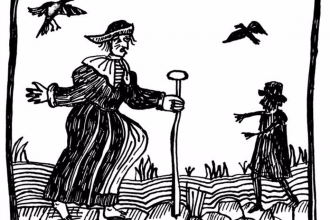2
Years later, I crossed a blue avenue, much wider than the one down which the wanderer had walked. The same rights and wrongs thathad taken me far away had now brought me back to Santa Bárbara de la Frontera.
One Sunday I awoke very early, keen to go to the market.
And there he was. Taller than everyone else, with the sun beating down on his back. He was dressed all in white and under a wide-brimmed hat his greying hair hung over his shoulders. A frayed bag was slung over his torso. He recognised me, too. He elbowed his way through the crowd and came towards me. When we were face to face, I once again found myself gazing into those blue eyes that I had first encountered as a young boy.
After a long silence, like someone condemned to repeat the same words over and over again, he asked in a low voice: ‘Which way is it to Brazil?’
‘Keep going north, to the bridge, cross it, and after about five hundred metres you’ll reach the border,’ I answered quickly, as though I had never left that place.
He hesitated for a moment, then slapped me nervously on the shoulder and winked at me. He set off at a determined pace. At the end of the road, he suddenly made a great leap forward and, while almost floating in the air, kicked backwards.
I wanted to shout to him to stop. But in a confusion of memories I was paralysed as I watched the grey brocket disappear again from my life. At that moment, someone called to me from behind, pulling me out of my reverie. When I turned I found the preacher blessing me with the sign of the cross. He proffered his old Bible and said in a husky voice: ‘To cure the souls … of free spirits.’
“The Last Grey Brocket” is part of Julio Figueredo’s book At the Even Hour: Confessions and Regressions.
[toggle_box title=”About the Writer” width=”Width of toggle box”]
Julio Figueredo was born in Montevideo, Uruguay, in 1944. He was a window dresser at the Angenscheidt department store, a basketball player for Club Goes, a lover of the arts and a supporter of the Lista 99. In 1967, he emigrated to Europe and became a citizen of the world. He has lived in many countries, working in all manner of trades. He was a model and acted in film and television. In London he married Karen Doherty, with whom he founded the now legendary restaurant, The Camden Brasserie. He currently lives in Punta Ballena, Uruguay, and Camden Town. He has always written. “At the Even Hour” is his first book.
Translator’s Bio: Born in Exeter, UK, to an English mother and Italian father, Simon Bruni first fell in love with Spain and its language as a teenager. After graduating in Spanish and Linguistics he established himself as a freelance translator in Spain, where his interest turned to literary translation. Awarded a distinction in his Masters in Literary Translation, he won a John Dryden Prize for his dissertation piece, a translation of the novel “Celda 211” by Francisco Pérez Gandul. Julio Figueredo’s part-real, part-imagined collection of short stories, “At the Even Hour”, is his first published literary translation. He has two more books on the way.
[/toggle_box]Featured work: “Sphinx”, by Negative Feedback




